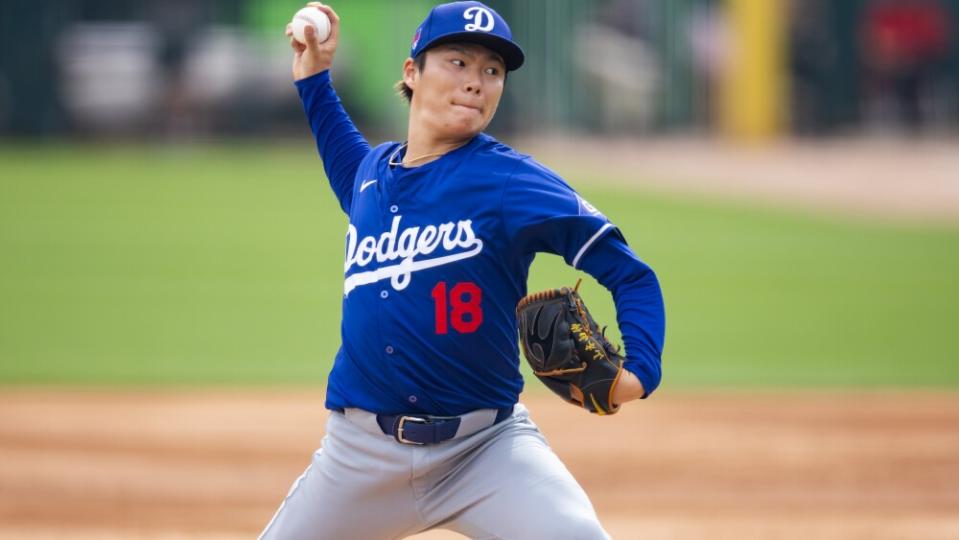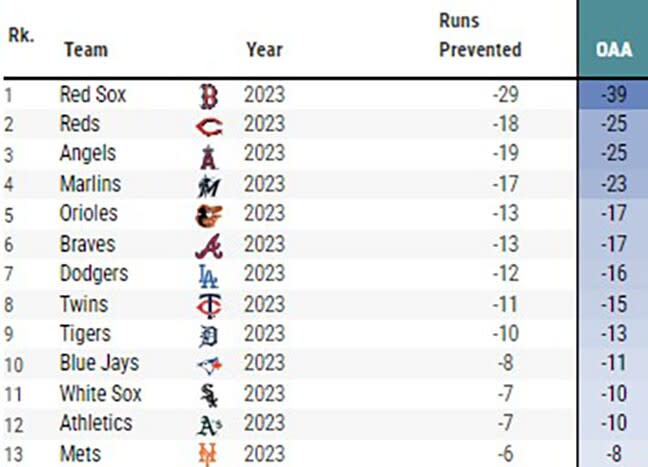Starting pitchers who could be hurt by their defense

When we're trying to find value in fantasy baseball drafts, we're always searching for any possible edge. Even though defense is not part of fantasy baseball scoring, it can often be an overlooked part of our analysis. Good defense can keep a hitter on the MLB roster or in the starting lineup. A good defense can make an above-average pitcher perform like a good one.
On the flip side, a poor defense can hurt a pitcher. Pitchers with high groundball rates are particularly reliant on their infield defense behind them to make plays and with the banning of the shift last year, organizations have one less trick to hide a defender who may have suspect range. As a result, I thought it might be useful to look at some of the defenses that could be among the worst in the league this year and see which pitchers might be impacted by this. While this won't change your rankings or desire to draft them too much, it may help you break a tie between two pitchers you have closely valued.
So, first: which were the worst infield defenses in 2023 according to Statcast's Outs Above Average (OAA)?

To start, we should mention that the Red Sox, Reds, and Angels will have different infield defenses in 2024. The Red Sox will now get a full season of Trevor Story, who had a really good defensive season in his few games last year, and also have Vaughn Grissom at 2B (soon) over Pablo Reyes, which is a slight upgrade. The Reds now get a full season out of all of their prospects, and considering all of Elly De La Cruz, Matt McLain, Christian Encarnacion-Strand, and Jeimer Candelario were average or above in OAA, I don't consider the Reds a bad infield defense for 2024. The Angels will also feature a full season of Zach Neto and Nolan Schanuel and will start with Anthony Rendon at 3B.
Other teams will have some changes too with the Dodgers having a new MIF with Mookie Betts and Gavin Lux swapping spots, but that hasn't worked out this spring. The Marlins have Tim Anderson at shortstop now, but he was below average defensively last year, and the Orioles will likely have Jackson Holliday at 2B. Edouard Julien should be the everyday 2B for Minnesota (well, against righties), and Colt Keith will start at 2B for Detroit. The Blue Jays lost the elite defense of Matt Chapman, but the White Sox gained the plus defense of Nicky Lopez and Paul DeJong, even if they bring little to no offense.
So which pitchers could this impact in 2024?
Bryan Bello and Tanner Houck - Red Sox
As I mentioned above, the Red Sox defense should be improved this year, but they were so bad last year that an improvement could still lead to a bad defense. That could hurt Bello, who had a 56% groundball rate last year, and Tanner Houck, who had a 53% groundball rate. Now, the interesting caveat here is that most projections ding Boston pitchers because Fenway is a hitter-friendly park. Since Bello and Houck give up so many groundballs, they're impacted by the park much less than their teammates. However, now they can be impacted by the defense. All of which is to say that it might actually even out a bit in the end. They may allow more groundball hits that should be outs, but they'll also allow fewer home runs that should be flyouts. Perhaps that's not such a bad trade-off.
Patrick Sandoval - Angels
There aren't many Angels starters who are fantasy-relevant, despite my continuous desire to hope for positive returns from Reid Detmers, Griffin Canning, and Chase Silseth. Of that crew, only Sandoval is a groundball pitcher, with a 47% mark last year. He relies heavily on a change-up to right-handed hitters so that figures to continue to be an issue for him and given his poor team context as well, it's hard to get overly excited about him this year.
Edward Cabrera, Trevor Rogers, and Braxton Garrett - Marlins
I know both Cabrera and Garrett are hurt right now, but neither one is expected to be out for a while, so they will come back into the 12-team league conversation at some point soon. When they do, we may need to talk about their defense. Last year I was concerned about Sandy Alcantara being impacted by the defense of Joey Wendle and Luis Arraez, and now I'm concerned again about the Marlins' infield defense. Their defense wasn't good last year, and now they'll get full seasons of Jake Burger, who had a -9 OAA last year, and Tim Anderson, who had a -2 OAA. Cabrera had a 54.3% groundball rate in 2023, but he had started to change his approach in spring and was pitching more up in the zone, which could help him. Garrett had a 49% groundball rate last year and relies heavily on a cutter, which usually means lots of groundballs. He could be more impacted by the poor defense, despite what the numbers may say from last year.
We may as well also throw Rogers in there. When he was electric two years ago, he didn't have a high groundball rate, but he was over 50% in a small sample last year and is over 50% in spring as well. We just have no idea what version of him we're going to get this year, but if he's giving up groundballs near that mark, he could be hurt by this defense.
We don't often think of the Braves as a poor infield defense, but they were the sixth-worst defense by OAA last year. Ozzie Albies graded out shockingly poorly at -10, which was the 10th-worst grade of any infielder. Austin Riley finished with a 0 OAA, Matt Olson was at -3, but Orlando Arcia graded out positively with a 5 OAA. Of the starting pitchers, that would most impact Max Fried, who had a 58% groundball rate. Now, you'll say, "But he had a sub-3.00 ERA last year," and I'll say, "Yes, this is why this information can be used as part of an equation in the draft or to split a tie but not as a major determiner." If Fried pitches a full season, he may have a handful of games that are worse than they should have been because of his defense but that could also be two runs allowed in seven innings instead of a shutout, etc.
Tyler Glasnow, Bobby Miller, and Yoshinobu Yamamoto - Dodgers
Much like with Fried above, we're not going to pass on these three potential aces because of the infield defense behind them, but the Dodgers infield defense looks like a mess right now. It's hard to feel good about them behind your pitcher, especially since we saw first-hand how they torpedoed a Yamamoto start in the spring. In addition to him, it could be an issue for Glasnow, who had a 51% groundball rate last year, and Miller, who had a 48% rate. I'm probably least concerned about Miller because last year was his debut, and I think he's going to miss way more bats this year after some subtle pitch mix changes and a little more confidence to attack the zone. I'm not really concerned about Glasnow and Yamamoto, but I fully expect to scream at the TV a few times when watching their starts because of the defense behind them.
I should point out that I know that we love Mookie Betts because he's talented and a team player and will play anywhere, but can you have him as your shortstop if you want to win a World Series? He graded out as -1 OAA at second last year and -2 OAA in his 90+ innings at shortstop. He also had just under -2 Error Runs Above Average at shortstop. I don't think Gavin Lux is so good that you need to have Mookie at short. Just trade for Willy Adames and put Mookie back at second or start Miguel Rojas at short and move Mookie to second. This team has enough offense that they can move from Lux to Rojas and still be a great offense.
Kevin Gausman - Blue Jays
Gausman's groundball rate is just 43%, so this isn't a major concern, but the Blue Jays had a bad infield defense last year and are replacing Matt Chapman with Justin Turner. That's not going to help. Vladimir Guerrero Jr. ranked as a -10 OAA, but perhaps his "best shape of his life" offseason will help his defense. Bo Bichette also graded out at -3 OAA, and Cavan Biggio was at -4, so if he starts at 2B that might not be a great combination. Now it's beginning to make sense why the Blue Jays have a bunch of flyball pitchers and a really good outfield defense.
Framber Valdez and Hunter Brown - Astros
Interestingly, the Astros graded out as a slightly below-average defense, and it seems to be because of the aging right side of the infield. Both Alex Bregman and Jeremy Pena graded out well, but Jose Altuve put together a -3 OAA season and Jose Abreu had a -6 OAA season. That could impact heavy groundball pitchers like Framber Valdez and Hunter Brown when they face left-hand heavy lineups. I don't think this is a big issue since it's really just groundballs to the right side, but it's something to keep in mind.
I plan to look at the new defensive metrics after about a month of the season to see which teams are trending in the right or wrong direction. At that point, we may be able to identify some more pitchers who could be impacted by their defense or assuage some of our concerns about the guys we just talked about.

